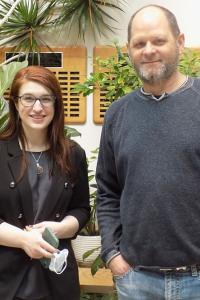 On February 2, 2022, Jodi Corley successfully defended her thesis titled, "A Post-transcriptional control of Pseudomonas aeruginosa virulence genes by global regulatory networks”. She is pictured with her mentor Tim Yahr, PhD.
On February 2, 2022, Jodi Corley successfully defended her thesis titled, "A Post-transcriptional control of Pseudomonas aeruginosa virulence genes by global regulatory networks”. She is pictured with her mentor Tim Yahr, PhD.
Research
Pseudomonas aeruginosa is a bacterium that can cause destructive infections in humans. Infections can be especially detrimental to the lungs of people with cystic fibrosis. To cause infection, P. aeruginosa uses several weapons known as virulence factors. Production and utilization of virulence factors depends upon the environment and are highly controlled at genetic levels. Small non-coding RNAs (sRNAs) 0161 and 179, and the RNA binding proteins Hfq and RsmA are some regulators of virulence factor expression.
P. aeruginosa produces a syringe and needle-like structure called the type III secretion system (T3SS) that injects toxins into host cells during some infections. Production of this machine is aided by RsmA but blocked by sRNAs 0161 and 179 along with Hfq. We sought to determine how these sRNAs and Hfq prevent T3SS gene expression. Furthermore, RsmA not only contributes to T3SS biogenesis, it also prevents expression of additional virulence factors like biofilms that contribute to other types of infection. Biofilms make infections more difficult to treat with antibiotics. We also aimed to unravel mechanisms important for the balance of RsmA within P. aeruginosa, which would coincide with an infection type. We discovered a mechanism that explains how RsmA reduces its own levels within the cell. Together, these contribute to new information on how virulence genes are regulated in P. aeruginosa.
Background
Jodi grew up skiing and hiking in Colorado. As the daughter of an electrical engineer and a geologist, Jodi learned to have a healthy appreciation of math and science from a young age. From fossil and rock hunting to exploring tide pools and waterfalls, the beauty and intrigue of the natural world was always an important part of her childhood. As she grew, she learned that science and medicine must be a part of her life and in middle school, she began researching the genetic condition cystic fibrosis (CF).
For college, Jodi moved to the windy state of Oklahoma, where she discovered microbiology. Nothing compared to the beauty of the bacterial cells she observed under the microscope. She found them magnificent because of her awareness that something so minuscule could make such incredible contributions to its surrounding world. She isolated bacteria that caused intramammary infections in beef cows she milked herself during her undergraduate research.
Jodi chose degrees in Health Science and Clinical Laboratory Science to find work marrying the fields of healthcare and microbiology with the ultimate goal to use science to help people with CF. During the internship for her degree, she learned about the human body from a laboratory context, from identifying immature blood cells to measuring sweat chloride levels to aid physicians in their diagnosis of cystic fibrosis. The clinical microbiology lab was her favorite rotation, during which she learned how to isolate and identify bacterial and fungal pathogens from a large variety of body sites. Afterward, she became certified as a Medical Laboratory Scientist from the American Society for Clinical pathology. Shortly after that, in 2017, she received her Master of Science degree in Natural Sciences studying extracellular polysaccharide production by the Burkholderia cepacia complex isolated from people with CF under Dr. Sallie Ruskoski.
In 2018, she joined Dr. Tim Yahr’s lab and studied bacterial genetics. Her work focused on post-transcriptional regulation of genes important for virulence, primarily the type III secretion system in Pseudomonas aeruginosa. After finishing her PhD, Jodi will be transitioning to a more CF-centered career by joining the lab of Dr. Katie Hisert at National Jewish Health in Denver. She will investigate the interplay of host macrophages and non-tuberculous mycobacteria infection in CF.
Outside of the lab, Jodi enjoys spending time with her friends, reading, listening to music, trying new restaurants (pre-COVID-19), kayaking, eagle watching, hiking, painting, antiquing, exploring, participating in the Great Strides Walk for CF, and volunteering at STEM events.